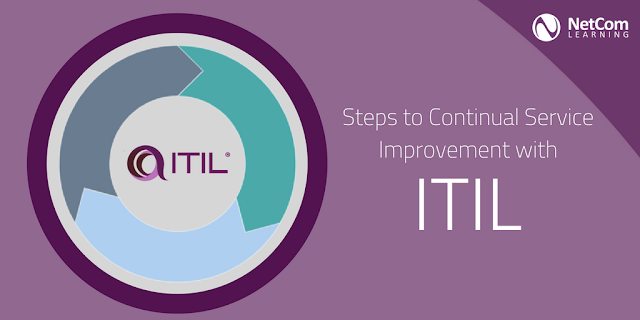7 Steps to Continual Service Improvement with ITIL
Businesses are rapidly incorporating ITIL (Information Technology Infrastructure Library) framework into their diverse processes to leverage its potential capabilities for enhanced business performance. ITIL framework outlines the best practices and envisions service improvements from the IT service management to enhance efficiency and optimize service delivery cost, provided the touch points are identified timely during the service lifecycle execution. Termed as Continual Service Improvement (CSI) in ITIL, this approach includes a module, defining the techniques and processes to help to align the service levels with continuously changing business processes.
The CSI (Continual Service Improvement) process in ITIL is a seven-step process comprised of the following stages:
- Define Objectives: The first stage involves clearly defining the objectives to improve the business processes and patterns of service delivery. This includes identification of services and the extent to which they need to be altered or replaced. The decision can be made by measuring the standards of the delivered services and feedbacks. Service strategy and service design phases can be revisited to derive the service improvement goals.
- Determine Measurables: During the second stage, an ITIL certified professional is entrusted with the responsibility to identify the service areas, that need to be assessed based on suggested guidelines, budget changes, IT capabilities and available resources. In this stage, gap analysis is also performed to identify loop-holes, if any.
- Collect Data: Based on the service operation goals and objectives, crucial data is collected keeping the data quality intact. This requires close monitoring and use of specialized techniques to gather the data that lays the foundation of service improvement.
- Process Data: After collecting the relevant data, it is organized in a presentable format conveying the purpose to the audience efficiently. This stage incorporates two important concepts of ITIL namely, CSF (Critical Success Factor) and KPI (Key Performance Indicator), that help in transforming raw data into meaningful measurable information.
- Analyze Data: The organized data is finally analyzed to identify the service delivery and delivered quality gaps. The evaluation process considers internal and external factors affecting the service delivery levels and reflected data. This helps in easy conversion of information and knowledge into facts.
- Present Information: The ascertained facts are presented to the stakeholders offering deep insights into the improvement plans driving realization of the end objectives. This stage facilitates the decision makers in the organization, to make informed decisions strategically on final execution of the service improvement plan.
- Implement Improvement: At the final stage, the improvement plan is implemented to the core and the execution steps are monitored and analyzed precisely to ensure achievement of the set goals. The stage sets the baseline and initiates an iterative service lifecycle to resume from the scratch.
Conclusion
Following stringent steps to improve services adhering to the ITIL framework helps you in enhancing service quality, reducing costs and optimizing services deliverables with respect to the available resources. Identifying the importance of ITIL framework, organizations are striving to hire ITIL certified professionals having an in-depth understanding of ITIL core concepts, nomenclatures, best practices, processes, and techniques.
The beginners can build their understanding on service delivery and related areas with ITIL Foundation training and certification courses. To acquire far-reaching capabilities on diverse modules of service strategy and delivery, service operations, service design and continual service improvement, you must move ahead with ITIL Intermediate training courses from the authorized training partners. You can take the ITIL courses via classroom or online training modes in custom learning schedules at affordable training costs.
NetCom Learning is a Licensed Affiliate of ITpreneurs, which is a PeopleCert ® Accredited Training Organization (ATO) for the ITIL ® Course.
ITIL® is a registered trademark of AXELOS Limited, used under permission of AXELOS Limited. The Swirl logo™ is a trademark of AXELOS Limited, used under permission of AXELOS Limited. All rights reserved.
NetCom Learning is a Licensed Affiliate of ITpreneurs, which is a PeopleCert ® Accredited Training Organization (ATO) for the ITIL ® Course.
ITIL® is a registered trademark of AXELOS Limited, used under permission of AXELOS Limited. The Swirl logo™ is a trademark of AXELOS Limited, used under permission of AXELOS Limited. All rights reserved.



Comments
Post a Comment